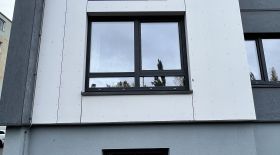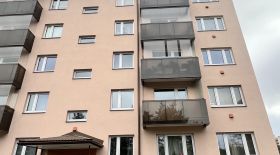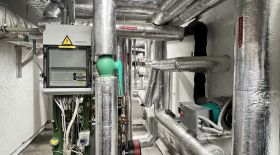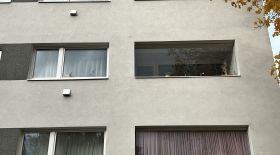Could Tallinn's renovated neighbourhoods turn out to be stamped as 'lighthouse districts' that bring together new tech, co-creation and social innovation?
What did the Estonian capital get right before anyone else in the region?
Tallinn, Estonia, 20 October 2022 | Published in Energy, Social, Future of the EU & Housing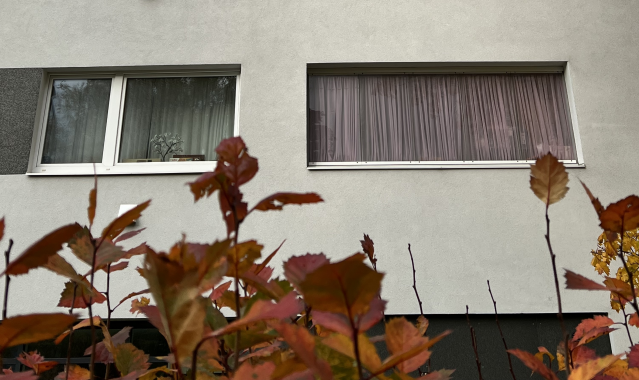
For any policymaker, city, housing provider or construction expert who is trying to get his or her head around how to kickstart or scale up socially-just renovation in Eastern Europe, here are 10 first takeaways from the first study visit of the European Affordable Housing Consortium, SHAPE-EU to Tallinn.
1. Political commitment, leadership and continuous public investments have been transforming entire housing districts. As a result, Eurostat figures are showing that the percentage of low-income vulnerable households is decreasing.
2. The country has a special model for a couple of reasons: 97% of the population in Estonia owns a home and every building is a housing cooperative on its own. In numbers, we are speaking about 23,000 housing associations that are closely supported by Housing Europe’s member, the Estonian Union of Cooperative Housing Associations (EKYL). The leadership qualities of the head of each association and EKYL’s regular training have proved to be vital for the progress of homes’ transformation. Trustful and dedicated leaders have done miracles.
3. While we are busy getting the EU Green Deal right, and deciding on essential pieces of legislation, such as the Energy Performance of Buildings Directive (EPBD), the beauty of transformed neighbourhoods has also been extremely valued by residents. The New European Bauhaus has rightly pointed out aesthetics as a major pillar of tomorrow’s neighbourhoods. Our experience this week shows that in addition to cooling off the planet, ordinary households also want to see the immediate effects of renovation that they can feel and witness firsthand.
4. The arguably small size of Estonia and the hundreds (if not thousands) of entirely identical residential buildings have been used to its favour. Working on a renovation standard only for the country is speeding up the works and experts sometimes are just a call away. An important realisation that could be valid for the majority of similar EU states.
5. The Eastern European country is one step ahead with the district approach, proving that improving more than a single building at a time saves resources and makes areas seem more cohesive.
6. Even after hundreds of success stories in different cities, many homeowners are still fearing to enter in renovation mode. The reasons are the expected financial burden (despite the loans), sometimes heavy administration and discomfort during the works. So, getting to know people’s concerns and showing up for them each time continues to be a daily reality for cooperatives.
7. After years of researching renovation techniques and especially a nearly-zero energy (nZEB) student dormitory building in the capital, a PhD graduate from the Tallinn Technical University has found out that extremely deep renovation of this kind is not so cost-efficient. Instead, a few centimetres less wall and roof insulation, and a class B or C would have helped to reach the decarbonisation + savings + comfort goal that we want to achieve.
8. Deep renovation in Estonia most often means class C, considered to be an optimal approach that delivers.
9. We are bearing the fruit of the International Social Housing Festival in Helsinki and the network of the SHAPE-EU peers. Key players in renovation from neighbouring Latvia and Lithuania but also Spain, Ireland, and Croatia travelled to Tallinn to look for inspiration. “We are jealous in the positive sense of the word and wonder why our countries are not taking this path”, we heard as a wrap-up by the Baltic states.
10. In 2023, Tallinn will be the European Green Capital. So, hopefully, we have provided you with 10 reasons to visit and learn from it.
The learning, however, continues already now.
The European Affordable Housing Consortium for Social Impact, SHAPE-EU is working on a set of straightforward guidelines for a fair renovation that takes people, the planet, and innovation seriously.
Get in touch if you are interested in joining as an expert, benefiting from the tools the project provides or featuring your area as an 'affordable lighthouse district' www.shape-affordablehousing.eu
In the same spirit, you can also hurry up and register for our Renovation Summit on the 16th and 17th of November in Brussels. Two days of thoughtful discussions, practical examples and knowledgeable speakers for which you can reserve your seat is this way www.shape-affordablehousing.eu/events

